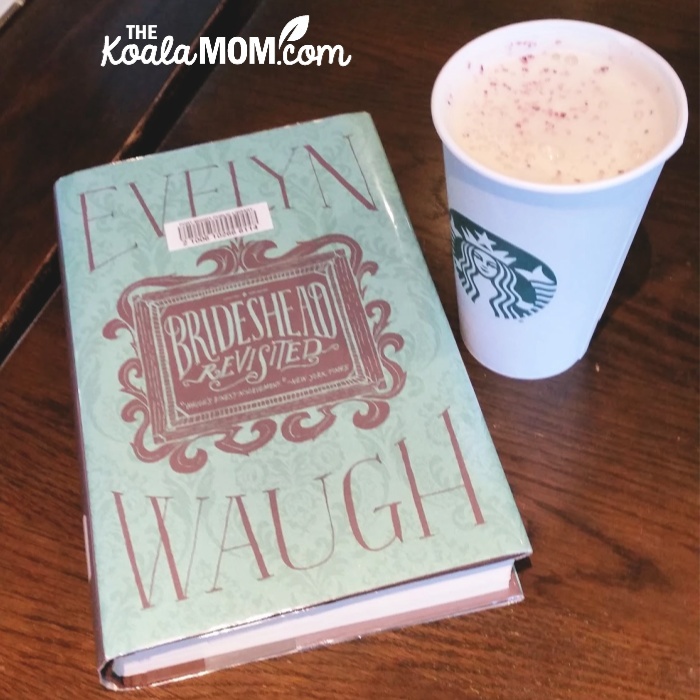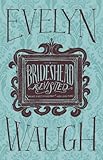When a friend of mine mentioned starting a book club, I said “yes.” I’ve only been involved in one book club (if you don’t count the novel courses I did as part of my university English degree—they were pretty fun!) but I love discussing books. It took us half a year to actually meet to discuss a list of books to read together. This fall, three of us kicked off our book club with Evelyn Waugh’s novel Brideshead Revisited.

This post contains affiliate links; as an Amazon associate, I earn from qualifying purchases.
The first half of Brideshead Revisited reminded me of The Great Gatsby by F. Scott Fitzgerald. Ryder is the first-person narrator, but he’s more like a lens through which the reader views Sebastien, a charismatic and interesting friend (like Nick Carraway telling Jay Gatsby’s story). The second half of the novel reminded me of The End of the Affair by Graham Greene (our next book club pick!). Unusual events lead to a climactic final conversion scene that pulls together the entire story before then.
Brideshead Revisited plot summary
Brideshead Revisited opens towards the end of World War II. Charles Ryder is responsible for moving his company of men to a “secret” new military camp. With much hustle and bustle, the men are organized, loaded onto trains, and arrive in the foggy darkness at their destination. When Ryder asks where they’ve ended up, he finds he knows this place well. The name brings back a host of memories…
The story then jumps back twenty years, to Ryder’s university days. His first friend at Oxford is Sebastien, an outgoing, likeable fellow student with a giant teddy bear named Aloysius. Sebastien draws Ryder into his circle of friends and the two carouse together for their first year as students. Then Ryder returns home to his father for the summer, and finds he’s broke and trapped in a disagreeable home.
 A telegram from Sebastien sends him scurrying to Brideshead. This begins Ryder’s involvement with Brideshead and the Flyte (Marchmain) family, despite Sebastien’s initial desire to keep Ryder away from his family. Lady Marchmain is a Catholic who has attempted to raise her children in the faith, but seen two fall into agnosticism. Lord Marchmain left her a decade ago and now lives in Italy with his mistress.
A telegram from Sebastien sends him scurrying to Brideshead. This begins Ryder’s involvement with Brideshead and the Flyte (Marchmain) family, despite Sebastien’s initial desire to keep Ryder away from his family. Lady Marchmain is a Catholic who has attempted to raise her children in the faith, but seen two fall into agnosticism. Lord Marchmain left her a decade ago and now lives in Italy with his mistress.
The story follows Sebastien and Ryder’s friendship into their second year of university. Then, when Sebastien’s alcoholism pushes him away from his family and friends, Ryder turns to a career as an artist. The second half of the novel switches abruptly away from Sebastien. We get a greater glimpse of Ryder’s life, and his growing relationship with Sebastien’s sister Julia. Brideshead becomes his home as he is drawn more and more into the Flyte family life.
The end of Brideshead Revisited jumps briefly back to the military camp. Lord and Lady Marchmain have passed away and their children scattered. With little emotion, Ryder explores the place that meant so much to him as a young man.
The throes of religion and romance, family drama and haute culture drive the story of Ryder’s love for the Flyte family. Nostalgia for Oxford university days, strawberries, Venice and steamships punctuate this extraordinary account of friendship and divine grace. ~ Father Patrick Briscoe
My thoughts on Brideshead Revisited
I thoroughly enjoyed Evelyn Waugh’s novel and had a lot of fun discussing it with my friends. There was so much in Brideshead Revisited for us to unpack and consider. Waugh’s writing is beautiful and poetic, with unique, intriguing characters that almost leaped off the pages and descriptions that made it easy to picture Brideshead and other locations.
One afternoon in November Julia and I stood at a window in the drawing-room watching the wind at working stripping the lime trees, sweeping down the yellow leaves, sweeping them up and round and along the terrace and lawns, trailing them through puddles and over the wet grass, pasting them on walls and window-panes, leaving them at length in sodden piles against the stonework.
Word on Fire has some excellent book club questions for that helped us start our discussion. We chose Brideshead Revisited for its Catholic themes, yet faith is barely evident in the first half of the novel. As a convert, I found Ryder’s “outsider” perspective of a Catholic family, living their faith to varying degrees, very interesting.
As Briscoe says, “Waugh is a master of the human condition and seamlessly traces the threads of grace sewn through the life of Mr. Charles Ryder.” There were many ways in which I found myself identifying with members of the Flyte family. While the characters are each unique and dynamic, they are also in many ways “everyman,” prototypes of certain attitudes or roles.
“No one could really hate a saint, could they? They can’t really hate God either. When they want to hate him and his saints they have to find something like themselves and pretend it’s God and hate that.” ~ Cordelia
More about Evelyn Waugh
My kids all assumed, when they saw Waugh’s name on Brideshead Revisited, that the author was female. Arthur Evelyn St. John Waugh was born in 1903 in London, England. His father was the managing director for a publisher that handled Charles Dickens‘ works. His older brother Alec also became a well-known novelist.
Waugh began writing as a child. Like Ryder, he attended Oxford but left before finishing his degree and pursued a career as an artist. He also served in the military, traveled, and had an unhappy marriage, as Ryder does in Brideshead Revisited. However, his first marriage (to a woman named Evelyn) led to his conversion to Catholicism. He had seven children by his second wife, but then suffered depression and alcoholism (like Sebastien).
Brideshead Revisited was written in 1944, just after his service in the Royal Marines and Royal Horse Guards. He also wrote biographies of artist Dante Gabriel Rossetti and martyr Edmund Campion. Waugh died in 1966. His work regained popularity in the 1980s with the BBC series of Brideshead Revisited.
“I’ve always been bad. Probably I shall be bad again, punished again. But the worse I am, the more I need God. I can’t shut myself out from his mercy.” ~ Julia
Have you read Brideshead Revisted or any of Evelyn Waugh’s other novels? What did you think?

No Responses Yet